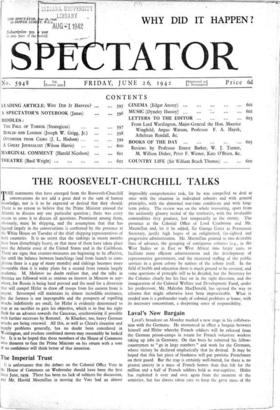The Imperial Trust
It is unfortunate that the debate on the Colonial Office Vote in the House of Commons on Wednesday should have been the first since June, 1939. There has been no lack of subjects for discussion, and Mr. Harold Macmillan in moving the Vote had an almost impossibly comprehensive task, for he was compelled to deal at once with the situation in individual colonies and with general principles, with the abnormal war-time conditions and with long- term policy. The review was on the whole reassuring, apart from the uniformly gloomy recital of the territories, with the invaluable commodities they produce, lost temporarily to the enemy. The presence at the Colonial Office of Lord Cranborne and Mr. Macmillan and, let it be added, Sir George Gater as Permanent Secretary, justify high hopes of an enlightened, far-sighted and progressive administration. Mr. Macmillan pointed to two desirable lines of advance, the grouping of contiguous colonies (e.g., in the West Indies or in East or West Africa) into larger units to facilitate more efficient administration and the development of representative government, and the increased staffing of the public services in a given colony by natives of the colony itself. In the field of health and education there is much ground to be covered, and some questions of principle still to be decided, but the Secretary for the Colonies clearly has his face set in the right direction, and the inauguration of the Colonial Welfare and Development Fund, under his predecessor, Mr. Malcolm MacDonald, has opened the way to reforms that might otherwise have been impracticable. What is needed now is a profounder study of colonial problems at home, with its necessary concomitant, a deepening sense of responsibility.


























